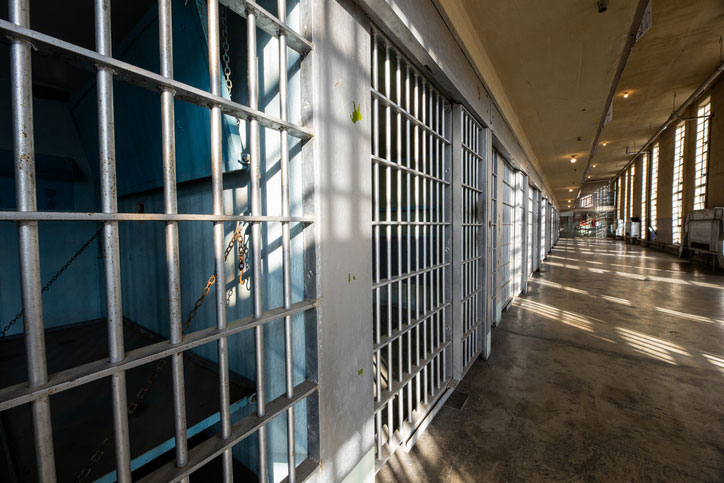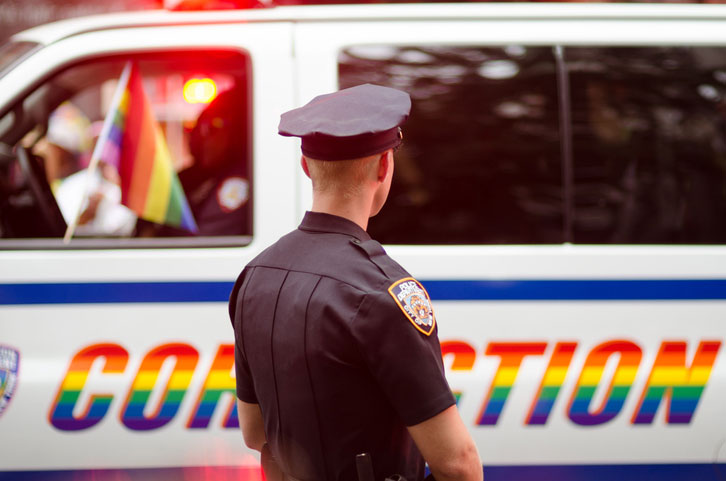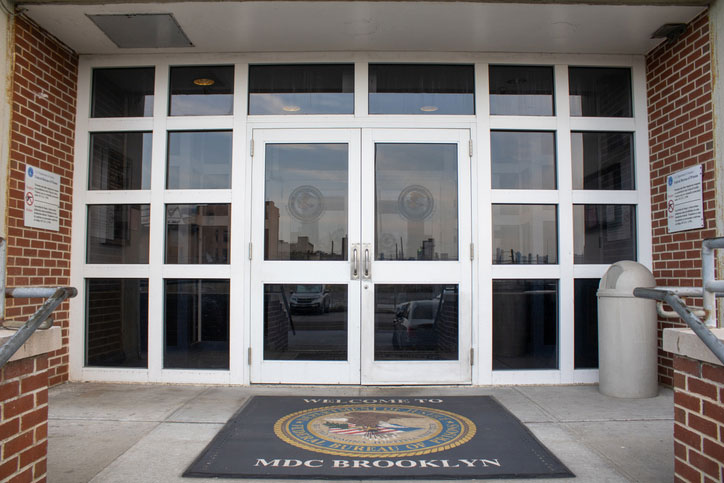Written by Scott Wilson

If you were thinking that forensic social work meant a job where you would go around and address despair and inequity in society by day and solve crimes by night, you’ll be disappointed. But what forensic social workers actually do can be even more important: they bring a societal perspective to matters of crime, victimization, and justice that helps humanize one of the least humane carceral systems in the world.
You can’t talk about social justice without including the justice system itself.
According to the New York State Department of Corrections and Community Supervision (DOCCS), in June of 2024 there were more than 33,000 individuals incarcerated in state prison facilities. That’s not counting city and county jails, where another 16,000 were being held. And it’s estimated that twice that total number were under some level of DOCCS supervision through parole agreements.
This is particularly distressing when it involves juveniles and young adults, who often absorb more bad than good from their prison experience.
The good news is that the DOCCS population has declined by more than half since 1999. The bad news is that the conditions within the system are still brutal… more than 1,000 assaults were reported on prisoners since January of 2024, and nearly as many on staff.
But even the most violent offenders contain the seeds of rehabilitation within them. What they want is for someone to ignite hope and show them the path.
What is a Forensic Social Worker? – The Roles and Functions of Forensic Social Workers in New York

This is a field of social justice practice that will challenge all your preconceptions about crime, criminals, and the justice system.
Forensic social workers work within and around the American justice system to bring social work theory and tools to matters of law and litigation.
They have roles in both civil and criminal justice matters, and may work on both sides of the system:
- Focusing on prevention and diversion
- Making incarceration a truly rehabilitative experience, and assisting with the transition back to freedom when sentences are finished
This brings them into a wide range of issues, including:
- Child custody disputes
- Sentencing recommendations and reports for convicted criminals, both adult and juvenile
- Mental health evaluations for prisoners in custody
- Review and evaluation of carceral environments
- Parole recommendations and reviews
- Oversight of reintegration of prisoners into society
- Post-carceral employment challenges
People of every age and from all walks of life become ensnared with both civil and criminal justice systems.
They deal with all of these matters by bringing the traditional set of social work skills to bear. A forensic social worker’s day may include:
- Monitoring a visit between family required by family court order to be supervised
- Leading a group therapy session in a county jail for substance use disorder patients
- Walking victims of domestic violence from marginalized communities through the process of filing police reports or requesting protection orders
- Conducting training for police or corrections officers with respect to dealing with people from other cultures or with mental health issues
- Interviewing clients and writing sentencing advocacy letters and developing individualized parole plans
The Job of a New York Forensic Social Worker Doesn’t Stop at Street Level
While direct engagement and counseling are a big focus in forensic social work, make no mistake: the criminal justice system is a bureaucracy where filing the right form can make as much of a difference as months of clinical therapy.
These are the kind of social work jobs that involve careful documentation from every angle. Dealing with anyone snared in the American criminal justice system comes with intensive record-keeping requirements. Combined with restrictions on direct intensive contact, that makes for a mezzo-level focus in this specialization. Frequently, however, these positions are combined with clinical work so state licensure is still often required.
With the current state of the criminal justice system in the United States in general and in the state of New York specifically, there is plenty of need for applying pressure at the highest levels for change.
Even clinical forensic social work positions can lean toward case management and triage in a system that is often overwhelmed with a huge number of defendants flowing through it.
Macro forensic social work in New York can happen both within the state correctional and law enforcement system and through outside advocacy groups covering every consideration for justice under the sun: the Justice Center for the Protection of People With Special Needs, WE ACT for Environmental Justice, Project SALAM Support and Legal Advocacy for Muslims and the well-known Urban Justice Center are all based in New York but push for change nationally and globally.
Legislative Victories Have Shifted the Role of Social Workers in New York's Juvenile Justice System
 In 1824, recognizing the victimization that came from jailing young offenders in with adults, the New York House of Refuge became the first separate juvenile incarceration facility in the country.
In 1824, recognizing the victimization that came from jailing young offenders in with adults, the New York House of Refuge became the first separate juvenile incarceration facility in the country.
But a prison for kids is still a prison. For minds still being formed and shaped, it’s a terrible place.
Gladiator academies is what they were once called. New York’s worst juvenile detention centers, places like Spofford in the Bronx, did little to rehabilitate kids convicted of crimes. Worse, with 95 percent of the population from minority groups, the racist overtones were stunning.
It was a sad development for a state and city once at the cutting edge of juvenile justice reform.
With violence and gangs seeping into juvenile correctional facilities, the role of social workers in the enforcement of juvenile justice in New York was in crisis mode.
Advocacy always finds a footing in serving justice, though. In 2010, the New York City Department of Juvenile Justice was absorbed into the Administration for Children’s Services department, bringing a social services perspective along with it. Spofford was finally shut down in 2011… a victory for social workers in juvenile courts.
In 2017, landmark legislation raised the age of criminal responsibility to 18, providing more intervention and treatment to 16 and 17 year-olds convicted of crimes.
By 2021, arrests of minors in the state was at an all-time low.
Getting the Right MSW Degree to Become a Forensic Social Worker in New York
The ideal preparation for these varied tasks in one of the toughest practice environments on the planet is a Master of Social Work, Forensic Social Work concentration.
That can include preparation for both clinical and more intermediate level practice, which can affect whether or not you need a license and what level of degree is required for forensic social work jobs.
This means diving into a slightly different set of coursework than the standards MSW program. You’ll have classes covering:
- Diversity and Social Justice Concepts
- Psychopathology and Clinical Social Work Practice
- Structure and Operation of the American Legal System
- Civil and Criminal Forensic Social Work Practice
Social workers in these positions face unique constraints that require extra attention to ethical considerations. For example, it may not be possible to have truly confidential conversations with clients in a detention setting. So coursework in ethical obligations and dealing with conflicting requirements receives special emphasis.
Forensic specializations in Master of Social Work programs may also offer additional coursework to help you develop skills in juvenile and youth counseling or crisis management.
Practicum opportunities in these specializations will put you right in the thick of it, working with organization like Brooklyn Defenders public defense office or Getting Out, Staying Out, a reentry program aimed at youth offenders.
If you’ve already earned a Master of Social Work, either as a generalist or in another speciality, some New York colleges offer post-degree certificate programs like an Advanced Certificate in Forensic Social Work which includes the specific coursework needed for the field.
Certification in Forensic Social Work Outlines Roles in the New York Criminal Justice System
Professional certification is a process through which major, reputable organizations assess your training and expertise in the specific tasks of forensic social work. With a national certification under your belt, employers can be assured that you have achieved the right professional standards to work competently in this sensitive area. It can improve your hiring potential as well as your salary.
For social workers in forensic roles in New York, the big national option for certification is from the American Board of Clinical Social Work (ABCSW). Through them, you can earn a Board Certification in Forensic and Correctional Social Work by meeting the following criteria:
- Hold a master’s or doctoral degree in social work
- Accumulate at least 24 post-master’s clock hours of supervised practice in forensic social work
- Practice for at least five years, with at least 2,250 clinical hours of experience in forensic social work
- Obtain at least 20 hours of continuing education in forensic social work within the year prior to applying for the credential
- Submit two colleague evaluations for your current practice in forensic or correctional social work
Of course, with criminals coming from all walks of life and every sort of marginalized population, there are plenty of other professional social work certifications that you might also find useful. Everything from gerontology to health care to children, youth, and family certifications could apply depending on your career focus.
What New York Organizations Hire Forensic Social Workers?

Social work careers in forensic roles are one of the most popular areas of practice in the field today. There are plenty of opportunities available.
Forensic social workers are often employed by public defender’s offices and non-profits with a focus on matters of justice and incarceration. The New York State Department of Corrections and Community Supervision, Division of Juvenile Justice and Opportunities for Youth, and the New York City Department of Correction are other big employers.
Other social workers may work directly for law enforcement agencies. They have often been used to provide training for law enforcement officers in dealing with the complex issues of poverty, mental illness, homelessness, addiction, and other societal issues that cross over with crime. Increasingly, however, they are finding work out on the streets in partnership with the police, responding to calls involving mental health or other issues that police are not trained or equipped to deal with.
The difficulties faced by convicts after release into a society that curtails their employment, housing, and social opportunities is another big focal point for social workers in criminal justice. Many programs designed to reintegrate ex-cons and prevent recidivism are set up by both official government agencies and independent social services teams that bring in social workers to manage them.
The major role of social work in juvenile justice also means there are many opportunities with non-profit organizations aimed at helping kids throughout the state.
By helping to turn one-time offenders into productive, proud, self-sustaining citizens again, New York’s forensic social workers are helping people turn their lives around, and reducing the potential for more crime victimization in society.
